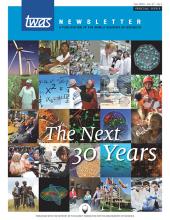Bai Chunli: TWAS and the horizons of science
Editorial
Looking back: 1985
The first TWAS Meeting thirty years ago – Messages of support and encouragement
Zakri Abdul Hamid: Can we heed alarms on biodiversity?
After a half-century of warnings, the loss of species is accelerating. We must summon the will and accelerate efforts to save our life-support system.
Marvadeen Singh-Wilmot: A creative way to offset brain drain
Brain drain has a deeply damaging effect on Caribbean countries. But is it possible that they could benefit by educating and training more scientists and sending them abroad?
Filippo Giorgi: Think global, work local
As the focus on climate change intensifies in years to come, understanding and response will depend on scientists with detailed local climate knowledge.
Gautam R. Desiraju: Crystallizing solutions
The early challenges of crystal engineering should remind young scientists to see their dreams “with clarity, conscience, dedication and quality”
B.N. Upreti: To cut disaster risk, invest wisely
Science and technology can reduce the risk of destruction and death caused by natural disasters. But first, policymakers must make it a priority.
Carlos Meza-Benavides: Global concern, local solutions
As nations develop, their need for energy will surge. To find solutions, scientists will have to leave their labs and go talk to policymakers, businesses and the public.
Samira Omar Asem: A vital link: food, land and gender
Within 30 years, we will have 2 billion new people to feed. To achieve food security, we must understand the role of women in food production and environmental protection.
Octavio Paredes-Lopez: A new strategy for food production
Developed nations are wealthy and wellnourished thanks to plants derived long ago from the less-affluent nations. It’s time for the South to embrace a new plan.
Jimmy Volmink: More transparency, better research
To win back the public’s trust, medical scientists must seek a new era of improved research ethics and transparency.
Wole Soboyejo: Learning from BRICs and Asian Tigers
In coming years, Africa will need to educate and train more than million new scientists and engineers. How to do it? The emerging economies offer good models.
Zhou Houlin: Access will transform the world
Information and communication technologies are driving development through innovation in education, health and banking. But to achieve the full benefit, we must seek universal access.
Rabia Hussain: A model for battling future disease
A pioneering campaign to control leprosy in Pakistan provides a powerful model for future science cooperation among nations, researchers and NGOs.
Pallava Bagla: Changing tools, timeless values
In a time of dramatic evolution, amazing discovery and occasional controversy, science journalists are the vital conduit between researchers, policymakers and the public.
Lilliam Alvarez Diaz: Maths a must for problem-solving
An aversion to mathematics among young people requires broad, creative efforts to encourage skills and raise awareness of its value to society.
Abdallah Daar: Development depends on mental heath
We know that nutrition, education and disease-control help overcome poverty. Slowly, we’re realizing the importance of mental health, too.
Francisco J. Barrantes: The world's most complex puzzle
Global brain research projects, supported by powerful new imaging technology, make neuroscience a promising field for young researchers.
Jane Lubchenco: A 'win-win-win' plan for healthy seas
A combination of natural and social sciences, and effective South-North partnerships, are helping to support fisheries in the developing world.
Flavia Schlegel: Policy for science, policy for peace
In order for science to achieve its full potential for humanity, policy must support stronger bonds between researchers and governments.
Zhang Linxiu: To reduce povery, improve parenting
Research is needed to understand how parental practices in the developing world may be inhibiting the development of their children.
Zafra Margolin Lerman: Science offers a hopeful new diplomacy
When you bring together committed scientists who work in a region of conflict, borders dissolve and human issues come into focus.
Hans van Ginkel: Urbanization is not the problem
Critics warn of poverty and pollution in sprawling mega-cities. But cities are engines of innovation, and we must envision a new harmony between urban and rural areas.
Fernando Quevedo: The powerful impact of basic science
Step 1: Invest in research, especially in physics and the basic sciences. Step 2: Nurture a culture of science. The result: Innovation that drives development.
Mohamed El-Ashry: Water policy for an era of scarcity
The global water crisis is linked to increasing demand and degraded supplies. To assure future supplies, policy and pricing must support innovative strategies.
Alice Abreu: More women, better science
To develop an innovation culture, we need to bring more women into science and engineering. To do that, we must look at policy and culture in new ways.
Sameh Soror: Building a system to support success
Many young scientists are among the brightest and most creative people in their generation. How can we free them to do their best work?

